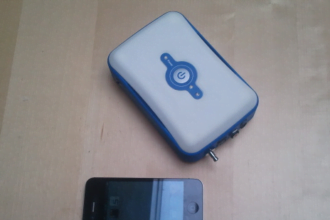 Online doctor/patient relationships are the new frontier in social media. A report earlier this year discussed how medical boards would respond to different sorts of potentially inappropriate activity on social media.
Online doctor/patient relationships are the new frontier in social media. A report earlier this year discussed how medical boards would respond to different sorts of potentially inappropriate activity on social media.
 Online doctor/patient relationships are the new frontier in social media. A report earlier this year discussed how medical boards would respond to different sorts of potentially inappropriate activity on social media. I asked Jeff Tangney, CEO of a professional online network for physicians called Doximity, to discuss the topic with me and to describe how Doximity fits in.
Online doctor/patient relationships are the new frontier in social media. A report earlier this year discussed how medical boards would respond to different sorts of potentially inappropriate activity on social media. I asked Jeff Tangney, CEO of a professional online network for physicians called Doximity, to discuss the topic with me and to describe how Doximity fits in.
How widespread of a social media challenge are medical boards dealing with? Are there a lot of instances of doctors using social media inappropriately or is it relatively rare?
Every profession adheres to a code of ethical behavior, but medicine carries an extra responsibility of safeguarding sensitive content, protecting patients and following privacy laws. Thus, the spotlight is cast on patient privacy violations conducted over social media, such as here and here. These instances are rare though, and state medical boards are now sensitive to these scenarios so that they can more quickly intervene. The “challenge” for physicians and medical boards is identifiying when, how and where social media technologies should be used to improve care delivery. Social media’s asynchronous and far-reaching properties are great tools for communication, continuous education and engagement beyond the 15-minute clinical appointment or physician phone call, and there are many physicians out there who will say that it’s had a very positive impact on their own practices.
What kinds of problems are typical?
Most problems can be traced back to HIPAA violations, such as improper de-identification of patient information or non-secure communication mediums.
Once the inappropriate behavior is pointed out, do the Gen Y doctors agree that it’s actually a problem, or do they disagree?
Tech-savvy Generation Y rode the first waves of social media as it crashed ashore, and in our experience most agree that embracing new efficient technologies can be done in a way that enhances and upholds the profession. Many young physicians choose to keep a Facebook profile, but they use privacy settings and know not to let it cross into their clinical practice, instead using tools like Doximity for professional conduct.
How have the norms changed over time?
The shift from in-person to online has been a slower one for the medical industry as a whole, but both patients and providers have grown to realize the real-time benefits of the right online or mobile technologies in information acquisition and secure communication. The greatest change in norm is increased familiarity and thus increased embrace.
How do patients feel about doctors’ online social networking behavior?
As patients ourselves, knowing that our physicians can have access to a national network of clinical experts right from their smartphone with a tool like Doximity is a technology milestone that we’re certain they should embrace.
What are the alternatives to general social networking sites? What are the pros and cons of using them?
General social networking sites, while offering a large userbase, and not tailored for a specific industry like medicine, making it difficulty to find the right people to share with. Additionally, they often allow anonymity, which does not build a prerequisite level of trust for health conversations. Doximity is designed exclusively for health professionals, and each user’s identity is verified, thereby enabling an unprecedented level of collaboration around patient care.
Some well known sites, like Sermo, have fizzled. Why?
Social media is a means to an end, not an end in itself. Doximity is the first secure network designed as a productivity tool by doctors, for doctors. Thus, even physicians that are too busy or too wary of common social media still choose to save time using Doximity’s national provider directory, mobile fax and secure messaging features.
How do you expect social networks for physicians to evolve over the next 5 years? Do you envision a role for doctor/patient interaction as well?
In the US healthcare system, patients on average see 19 different doctors in their lifetime, in the context of an industry approaching 20% of US GDP. It is clear that an interoperable, secure medical internet is critical, and Doximity’s growing platform and partners can streamline workflow and communication across the many participants in the system.
—-
Interview conducted by David E. Williams of the Health Business Group.







